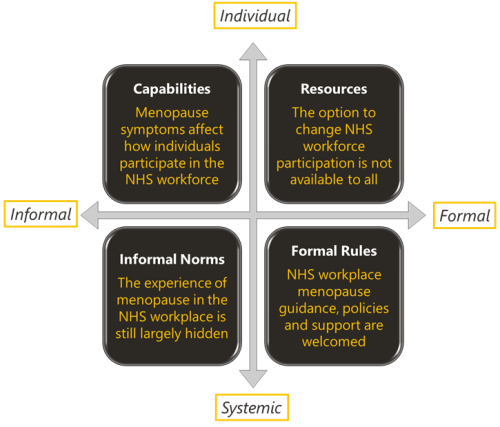 Better use of analysis | Inequalities | Policy
Better use of analysis | Inequalities | Policy
Menopause and the NHS workforce
The impact of the menopause on the NHS workforce. The Strategy Unit and Health Economics Unit report on their mixed methods findings.

MDSN: AI tools for evidence synthesis
With the advancing sophistication of AI and automation-based tools, we explore their use for evidence synthesis. This topic has great importance in a world where insurmountable volumes of information present a growing challenge to the considered (and timely) inclusion of robust evidence at all…

Rural Health Inequalities
The UK Government (2016) define rural areas as those which “fall outside of settlements with more than 10,000 resident population”. This accounts for 90% of England, with 17% of the total population living in local authorities defined as rural (Department for Environment, Food & Rural Affairs,…

Leadership training and support for organisational development: an offer from the Strategy Unit
The Strategy Unit has long been known for the quality of its analytical work, and the clear, critical thinking that underpins it. More recently, we have been asked to provide leadership training and support for organisational development. Individuals, teams, organisations and Systems have found…
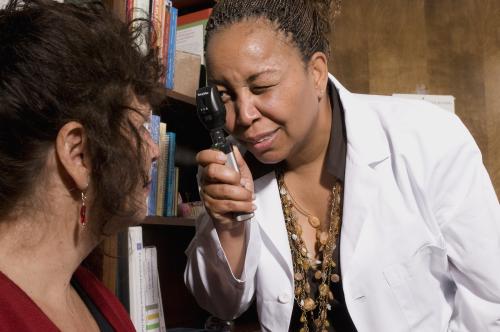
Review of Ophthalmic Managed Clinical Networks (MCNs) in Staffordshire and Shropshire
The aim of the MCNs is to bring together primary care optometrists with local ophthalmologists within a geographical area. This is a review Strategy Unit were commissioned by NHS England to work with a medical retina MCN in Shropshire, Telford and Wrekin and a glaucoma MCN in Staffordshire and…
 Emergency care | Inequalities | Primary, community and social care services
Emergency care | Inequalities | Primary, community and social care services
Learning about what works in urgent community response
The initial report from the national urgent community response (UCR) evaluation, along with an economic modelling tool to help service providers and systems understand the impact of UCR, is now available.

Exploring MSK Patient Pathways – Produced by Healthier Futures, Black Country
Exploring MSK Patient Pathways Patient Experiences: Facilitators and Barriers. And The Way Forward Full ReportJune 2023
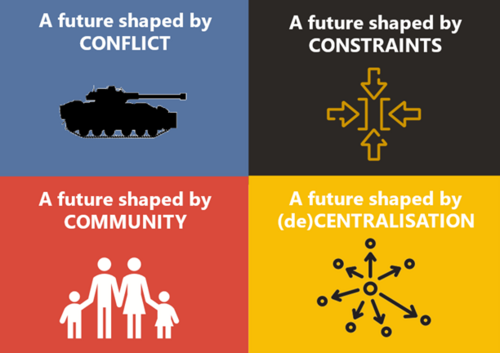 Primary, community and social care services
Primary, community and social care services
Exploring the Edge of Tomorrow, Today
Exploring the critical building blocks for a resilient social care system in 2035 with the West Midlands Association of Directors of Adult Social Services (WM-ADASS).
 Better use of analysis | Elective care | Inequalities
Better use of analysis | Elective care | Inequalities
Inclusive Elective Care Recovery
These case studies present the key features and learning from local initiatives which championed inclusive approaches to elective care recovery.
 Elective care | Emergency care | Policy
Elective care | Emergency care | Policy
How is growth in diagnostic testing affecting the hospital system?
Diagnostic services, such as medical imaging, endoscopy, and pathology, have grown substantially in recent years and at a faster rate than most other healthcare services. Increased diagnostic testing brings benefits to patients, but rapid growth of this service area within a complex, adaptive…
Insight to action blogs - a series of blogs from Lucy Hawkins
“Solving complex problems requires new approaches to problem solving…To do this, organisations and communities need to become skilled in mobilising intelligence of all kinds – data, information, insights and ideas. In the 21st century, we believe this will matter as much as mobilising money or…
 Secondary care | Service improvement
Secondary care | Service improvement
The NHS as an anchor institution: addressing fuel poverty
The number of households in fuel poverty in Staffordshire and Stoke-on-Trent (SSoT) is higher than the national average. As anchor institutions, NHS organisations can use their assets to influence the health and wellbeing of their local communities. The Strategy Unit was asked by the Midlands NHS…
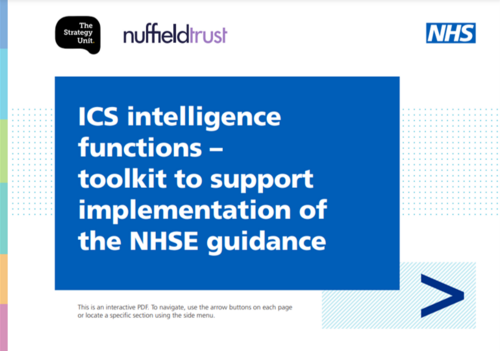 Better use of analysis | Policy | Integrated Care
Better use of analysis | Policy | Integrated Care
ICS intelligence functions – a toolkit to support the implementation of NHSE guidance
In 2020, NHSE announced the expectation that ICSs should develop “shared cross-system intelligence and analytical functions that use information to improve decision-making at every level.” This expectation has been followed by more detailed

Emergency department acuity measurement and process: quick scoping review
This review was commissioned to inform NHS England’s Acuity Standardisation Project which aims to agree a standardised method of allocating acuity category (a triage method) for Emergency Departments (EDs) and Urgent Treatment Centres (UTCs).
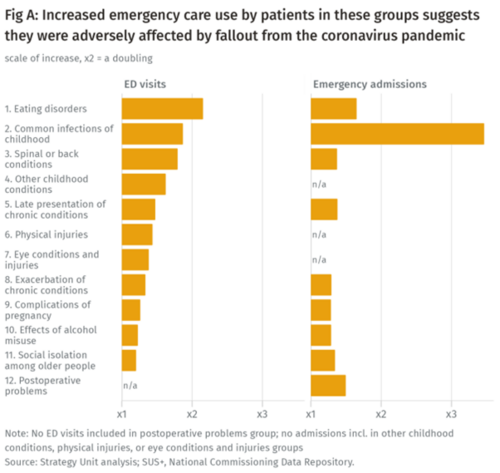 Better use of analysis | Inequalities
Better use of analysis | Inequalities
Population health implications of the Covid-19 pandemic
Our new report for The Midlands Decision Support Network (MDSN) presents findings of the effects of the care disruption, from the Covid-19 pandemic, on population health. The in-depth analysis identifies which patients and health conditions should be the focus of future efforts in reducing…
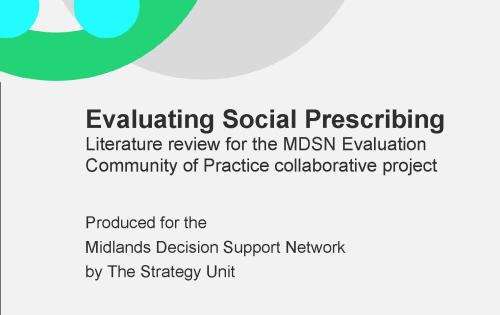
MDSN: Evaluating Social Prescribing Literature Review
Evaluating Social Prescribing – Literature review for the MDSN Evaluation Community of Practice collaborative project The review has been produced to support the Midlands Decision Support Network (MDSN) Evaluation Community of Practice (CoP) collaborative social prescribing evaluation project. The…
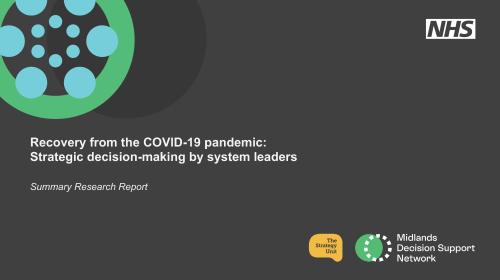
MDSN: Decision-making by senior leaders to support recovery from COVID
This paper summarises experiences of Integrated Care System leaders in making strategic decisions to support recovery of services from the COVID-19 pandemic. This paper is a short version of findings from a research study conducted during Q3 2021/22, drawing on interviews of eight out of the forty-…
 Inequalities | Public health and prevention | Secondary care
Inequalities | Public health and prevention | Secondary care
Socio-economic inequalities in coronary heart disease
There are substantial differences in mortality rates from cardiovascular disease between socio-economic groups. Our new tool provides an overview, for ICBs, of the points on the care pathway where inequalities emerge and are amplified
 Evaluation and impact assessment | Futures thinking | Learning and development | Strategy development
Evaluation and impact assessment | Futures thinking | Learning and development | Strategy development
Evaluating and embedding social values in procurement at East London NHS Foundation Trust
This report presents emerging findings from the early development stages of a social value approach to procurement by East London NHS Foundation Trust (ELFT). These findings provide insights for other organisations beginning to explore how to use procurement to contribute to improving health and…
 Elective care | Inequalities | Policy
Elective care | Inequalities | Policy
What are the ethical challenges in addressing inequities?
Produced by Angie Hobbs - the world’s first Professor in the Public Understanding of Philosophy – this paper examines the ethical questions raised by our report outlining strategies for reducing inequity.